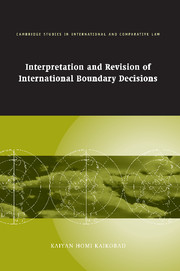Book contents
- Frontmatter
- Contents
- List of maps
- Preface
- Acknowledgments
- Table of cases
- List of abbreviations
- Part I Introduction
- 1 Introduction
- Part II The settlement of territorial and boundary disputes
- Part III Judicial remedies: interpretation
- Part IV Judicial remedies: revision
- Part V Conclusions
- Select bibliography
- Index
- CAMBRIDGE STUDIES IN INTERNATIONAL AND COMPARATIVE LAW
1 - Introduction
Published online by Cambridge University Press: 14 September 2009
- Frontmatter
- Contents
- List of maps
- Preface
- Acknowledgments
- Table of cases
- List of abbreviations
- Part I Introduction
- 1 Introduction
- Part II The settlement of territorial and boundary disputes
- Part III Judicial remedies: interpretation
- Part IV Judicial remedies: revision
- Part V Conclusions
- Select bibliography
- Index
- CAMBRIDGE STUDIES IN INTERNATIONAL AND COMPARATIVE LAW
Summary
Preliminary observations
Territoriality, it is well known, stands at the very heart of statehood. Both in law and in fact, it is difficult, but not impossible, to conceptualise a State without territory. The Montevideo Convention on the Rights and Duties of States, concluded in 1933, gave due weight to this when it recognised, in Article 1, that territory was one of the four component elements of an entity claiming statehood. It was this primacy which prompted Jennings to write: ‘The whole course of modern history testifies to the central place of State territory in international relations.’ An important aspect of territoriality and of statehood is the fact that they are primarily notions of law. They do, of course, have a corresponding political and factual reality, but from time to time a hiatus between law and reality can arise and create anomalies of various kinds. Thus, where a State is occupied by illegal armed force and is subsequently annexed by the occupying State, the State illegally occupied will continue in law to exist, not unlike the situation of Kuwait when it was invaded, occupied and annexed by Iraq in August 1990.
Nonetheless, it cannot be doubted that the ideal of territorial sovereignty guides and informs the foreign relations of States at the most fundamental of levels. While even the slightest possibility of territorial loss or detriment is vigilantly monitored and, where necessary, opposed, no opportunity to gain or maximise territory by lawful means is passed over.
- Type
- Chapter
- Information
- Publisher: Cambridge University PressPrint publication year: 2007

